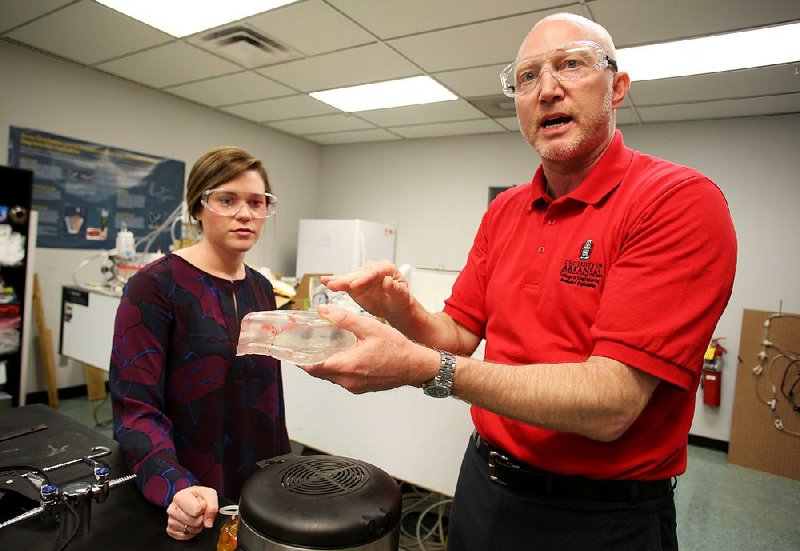FAYETTEVILLE -- Vivas LLC, a company founded by a group of University of Arkansas engineering professors, has developed and is marketing realistic training and testing devices for the medical field.
Using technology licensed from the University of Arkansas at Fayetteville and with its partner, Fort Smith-based Humimic Medical LLC, Vivas has already entered the market and secured clients including a hospital system in the U.S. and a large health system in Europe.
Vivas is in the business of making phantoms. In medical lingo, a phantom is a model of the human body or parts and is typically transparent but dosen't have to be. They can be used in training or to examine the viability of a technique to test new medical equipment. In the field of medical imaging, phantoms are used to train operators to tune or test sensitive gear, like ultrasound equipment or X-ray machines.
According to a report from ResearchAndMarkets.com released in March, the Healthcare/Medical Simulation market saw revenue of nearly $1.3 billion worldwide and is projected to reach nearly $2.6 billion by 2022. Major drivers in the industry include increasing demand for minimally invasive treatments and increasing focus on patient safety, according to a news release.
Morten Jensen, associate professor of biomedical engineering; Jamie Hestekin, professor of chemical engineering and Megan Laughlin, a doctoral student designed and created the phantoms with tube-like objects, simulating blood vessels. Laughlin said she started to design the items for her study of blood flow systems when she found the product currently available not up to snuff and too costly.
"So, we decided to make our own," she explained.
A key component to the products is medical gel that acts a lot like human tissue, produced by Humimic Medical, a sister company of Clear Ballistics, also based in Fort Smith. Clear Ballistics makes ballistic gelatin and ballistic dummies that simulate human flesh and are used to test the performance and effectiveness of firearms ammunition. Ballistic dummies are often seen in television programs like Myth Busters or Forged in Fire where they're used to simulate damage to the human body from trauma, such as from an explosion or a weapon.
Joel Edwards, founder of Humimic and Clear Ballistics, said the new phantoms combine realistic feel and reuse-ability, through the use of his company's proprietary gel merged with systems built by Vivas that accurately mimic blood vessels and how they react. On top of that, they can sell these phantoms for about half the price of those on the market today.
"This product is unique and cost effective," he said.
The deal was facilitated by the University's Office of Industry Engagement and Fayetteville-based Startup Junkie Consulting helped with advice, Jensen said.
Plans are for Vivas to develop a variety of products including adding organs like livers, kidneys and bladders. Other potential products include varieties of artificial urine or blood for use in the systems so they are as realistic as possible. Hopes are the company will grow and expand and provide high-tech jobs in the future.
"We're still learning but we're learning while we're doing," Jensen said. "We're really just scratching the surface."
SundayMonday Business on 04/22/2018
